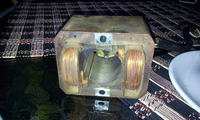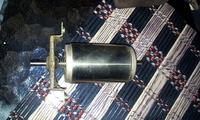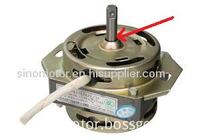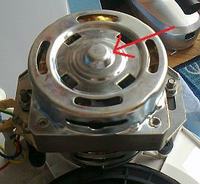supchem wrote: A question I have is why boil the plain bearing in oil and how will it help? ...
For many years, plain bearings (here pan bearings), are made by powder metallurgy. Not all, but 99.99% in low-power machines. The cheapening of this technology due to its virtually monopolization by a global supplier like the PRC has made them ubiquitous for a decade. Sinter, which usually consists of iron, bronze, graphite and patented additives, is cheap to produce because it requires virtually no machining. The essential feature, however, is its porosity; capillary holes are saturated with oil to ensure self-lubrication. Rotation of the shaft in the pan causes its temperature to rise, which causes oil to flow out - of this magnitude to give it an optimal lubricating film. Stopping the rotation and dropping the temperature, in turn, sucks the lubricant back into the pores of the pan.
Well, what about that cooking? It never hurts with usually helps. After a long period of use, the pan collects microcontaminants from the shaft, which, figuratively speaking, effectively seal the mouths of its micropores. The low price of the pan should make you want to replace it, but Lebanese practitioners have found a way both to clean its inner surface and to "re-inflate" it with oil. Boiling in oil is not patented and deviates from their manufacturer's technology, but life has proven the validity of the application. Boiled pan, - if they have not been seized early they work like new. There is a lot of material on the net about self-lubricating bearings, I give a link to "pictorial":
Link I'll just add that spherical bearings in motors of a design like the one in this thread - once commonly used in adapters and tape recorders, were the first to use their self-lubricating design.






